Ai soar
Download as PPTX, PDF1 like183 views
This document provides an overview of Appreciative Inquiry (AI) and compares it to traditional problem solving approaches. AI focuses on identifying an organization's strengths and positive aspects to drive change, rather than focusing on problems. The key aspects of AI discussed are its 5 principles, the cycle of 4 processes involving discovery, dream, design and destiny, and its emphasis on using positive, open-ended questioning. Overall, the document introduces AI as a strengths-based, cooperative approach to organizational change and improvement.
1 of 11
Download to read offline

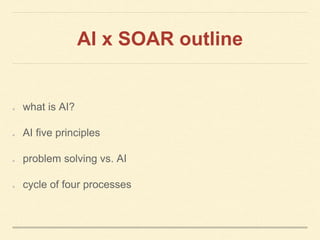


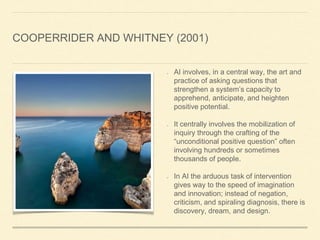

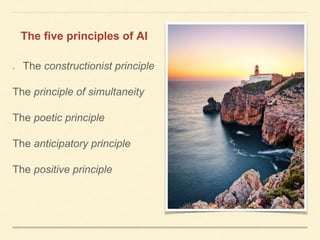




Recommended
Appreciative inquiry



Appreciative inquiryekata karki
╠²
Appreciative Inquiry (AI) is a cooperative search for the best in people and organizations. It involves systematically discovering what gives life when a system is most effective and capable. The core of AI is to focus on an organization's positive potential rather than problems. It uses a 4-D cycle of Discover, Dream, Design, and Destiny to unleash the positive core and drive transformation by studying what works well. In the Discover phase, interviews identify exceptional accomplishments. The Dream phase envisions a preferred future. Design creates plans for the future state, and Destiny implements innovations to realize the vision.Large Systems Change



Large Systems ChangeGlobal Conference on Positive Change
╠²
This document discusses large systems change and provides an overview of concepts and frameworks for understanding and facilitating change at a large, complex systems level. It introduces ideas such as change systems and production systems, and how they interact. Various tools and strategies for analyzing change systems and driving transformation are presented, including system mapping, scenarios, collective action processes, and social media. The document aims to develop understanding of how to build coherence and convergence across subsystems within a large change system.What Is Appreciative Inquiry Some Quotes On 1 Page



What Is Appreciative Inquiry Some Quotes On 1 PageJohn Loty
╠²
Appreciative Inquiry (AI) is a method that focuses on discovering the positive in organizations to help envision and achieve a desired future. It involves gathering stories of past successes and using them to imagine new possibilities. The goal is to expand what is thought to be possible and translate visions into reality. AI uses positive questioning to explore strengths and innovations, which generates compelling images of the organization's future potential.Appreciative enquiry 



Appreciative enquiry jawasadh
╠²
Appreciative Inquiry is an organizational development approach that focuses on identifying what is working well within an organization and amplifying it, rather than focusing on problems. It involves systematically discovering an organization's strengths and successes through the "4-D" cycle of Discovery, Dream, Design, and Destiny. The goal is to envision a preferred future and implement innovative changes that move the organization closer to that vision, grounded in what has worked well in the past. Appreciative Inquiry transforms negative dialogue into positive, optimistic discussions that strengthen relationships and resilience within organizations.Engage in Transformation with Appreciative inquiry



Engage in Transformation with Appreciative inquiryFr├®d├®ric Williquet
╠²
Appreciative Inquiry is a method for organizational change that focuses on identifying what is working well and envisioning positive potential, rather than focusing on problems. It involves discovering organizational strengths through cooperative exploration and questioning. Key principles of Appreciative Inquiry include focusing on positive narratives and images of the future to drive change, and the idea that our questions shape reality and guide the direction of change. The method involves appreciating what is good, envisioning positive potential, dialoguing about what could be, and designing and implementing plans to realize that potential.Appreciative inquiry



Appreciative inquirykarenannesander
╠²
Appreciative Inquiry (AI) is an approach to organizational change and development that focuses on identifying what is working well and leveraging those strengths, rather than focusing on problems. It was developed by David Cooperrider in the 1980s. The AI process involves 4 phases - Discovery, Dream, Design, and Destiny - to foster positive change. Through collaborative inquiry using carefully crafted affirmative questions, AI seeks to understand an organization's capabilities and potentials to envision a better future. It aims to shift dialogue from problem-focused to possibility-focused. A case study showed AI improved communication and collaboration among rural school district stakeholders by building trust and empowering participants.Evolution of ai theory and models



Evolution of ai theory and modelsRoberta Peirick
╠²
Appreciative Inquiry is an approach to organizational change that focuses on identifying what is working well within an organization and building on those strengths, rather than emphasizing problems or weaknesses. The core principles of Appreciative Inquiry include social constructionism, simultaneity, poetic principle, positive principle, anticipatory principle, and free choice. Appreciative Inquiry involves a 4-D cycle of Discovery, Dream, Design, and Destiny to help organizations envision and achieve a preferred future state.Appreciative Inquiry: Big Picture, Big Passion, Exceptional Achievement



Appreciative Inquiry: Big Picture, Big Passion, Exceptional AchievementiAttain
╠²
An introduction to Appreciative Inquiry, the process for organizational innovation and change based on positive psychology.Pentascope Masterclass Cooperrider 2008



Pentascope Masterclass Cooperrider 2008dlc6
╠²
This document provides an overview of Appreciative Inquiry and its applications in positive organizational change. It discusses principles of AI such as constructionism, simultaneity, and positive framing. The document outlines an AI summit method using large group methods to align an organization's strengths. It also provides example topics and questions for AI interviews focused on strengths, aspirations, opportunities, and results.Ai Certificate 2008 Longboat Key Cooperrider



Ai Certificate 2008 Longboat Key Cooperriderdlc6
╠²
This document discusses appreciative inquiry and positive change. It provides an overview of appreciative inquiry principles and methods, including focusing on strengths rather than deficiencies, generative questions, and envisioning ideal futures. Examples are given of appreciative inquiry topics and processes used in organizational change initiatives.Appreciative Inquiry and Strength-Based Systems



Appreciative Inquiry and Strength-Based SystemsRobyn Stratton-Berkessel
╠²
Workshop introducing appreciative inquiry using Positive Matrix, a collaborative software tool that energizes people and their enterprise to bring about positive change.║▌║▌▀Żs David Cooperrider Pre-Conference #2012WAIC



║▌║▌▀Żs David Cooperrider Pre-Conference #2012WAICWorld Appreciative Inquiry Conference 2012
╠²
║▌║▌▀Żs by David Cooperrider during the pre-conference of the 2012WAIC.
More information: http://www.2012waic.orgSlovenia Appreciative Inquiry ║▌║▌▀Żs With Cooperrider



Slovenia Appreciative Inquiry ║▌║▌▀Żs With Cooperriderdlc6
╠²
This document discusses Appreciative Inquiry (AI), a strengths-based approach to organizational change and development. It introduces AI principles and methods, including affirmative topic choice, the 4-D cycle of Discovery, Dream, Design, and Destiny, and the use of AI summits and interviews. Examples are provided of successful applications of AI in businesses to improve performance, speed up mergers, and increase employee engagement. The document advocates reframing issues positively to focus on strengths rather than deficiencies.Ai Workshop ║▌║▌▀Żs Used By John Loty In 2008.



Ai Workshop ║▌║▌▀Żs Used By John Loty In 2008.John Loty
╠²
These slides together with a workbook were used in a 2 day Introductory Workshop on Appreciative Inquiry and how AI is being used for change management and organisational development.Appreciative Inquiry: A Revolution in Change



Appreciative Inquiry: A Revolution in Changesuzukiassociation
╠²
Appreciative Inquiry is a method for positive change that focuses on an organization's strengths rather than its problems. It involves (1) discovering what gives life to an organization when it is most effective, (2) envisioning what could be to inspire change, (3) designing what should be with whole-system participation, and (4) delivering on the vision through individual and organizational action. The method mobilizes strategic change by shaping the future based on an organization's core strengths and values.Appreciative Inquiry



Appreciative InquiryAndrea Dvorak
╠²
Summary of the article 'If we can't do more, let's do it differently!': using appreciative inquiry to promote innovative ideas for better health care work environments.
As seen in the Journal of Nursing Management, 2009
Richer MC, Ritchie J, Marchionni C Change management and organization development appreciative enquiry



Change management and organization development appreciative enquiryShubham Singhal
╠²
Appreciative Inquiry (AI) is a method for studying and facilitating positive change in social systems like groups, organizations, and communities. It involves collective inquiry into what is working best to envision an ideal future state, then collective design of how to achieve that desired future. Rather than focusing on problems, it appreciates past and present strengths. The document then discusses the principles and 4Ds process of AI, examples of its use in businesses, how it can improve various aspects of organizations, and the impacts found after one organization used AI for large-scale change.Classroom MRIs--Mini-Research Intensives--Using Appreciative Inquiry (MSC 2008)



Classroom MRIs--Mini-Research Intensives--Using Appreciative Inquiry (MSC 2008)Mark Eutsler
╠²
This document discusses using Appreciative Inquiry (AI) in classroom settings. AI focuses on identifying what is working well and envisioning how to replicate successes, rather than focusing on problems. The document outlines key concepts of AI, such as valuing strengths and envisioning positive futures. It provides examples of AI-focused questions that could be asked in classroom settings instead of conventional problem-focused questions. The goal of using AI in education is to create a positive learning environment that brings out the best in students.Heithaus inman2010



Heithaus inman2010John L. Heithaus
╠²
Appreciative Inquiry (AI) is an organizational development approach that focuses on identifying what works well within an organization rather than focusing on problems. AI believes organizations should be embraced, not solved, and sees them as miracles rather than problems. It uses tools like social networking to develop sustainable solutions by envisioning optimal processes and prioritizing actions to achieve this vision. The goal of AI is to integrate and activate new designs through an appreciative lens.Entrepreneurship as an instructional model



Entrepreneurship as an instructional modellmittler
╠²
This document provides an overview of entrepreneurship as an instructional model. It begins with an activity asking readers to define entrepreneurship in 3 words, 2 questions, and 1 metaphor. It then discusses various definitions and perspectives on entrepreneurship from sources like Wagner, Zhao, and Martin and Osberg. Key aspects highlighted include critical thinking, agency, willingness to fail, and seeing problems as opportunities. The document also introduces concepts like systems thinking, feedback loops, leverage points, and design thinking frameworks that can be applied to entrepreneurship. Overall, it seeks to build a richer understanding of entrepreneurship beyond just starting a business.Appreciative Inquiry



Appreciative InquiryBritta L. Eriksen
╠²
The core tenets and applicability of Appreciative Inquiry at work - for students, new graduates, and seasoned professionals.Positive psychology appreciative inquiry workshop



Positive psychology appreciative inquiry workshopi4ppis
╠²
This workshop introduces school psychologists to the principles of Appreciative Inquiry and Positive Psychology. The workshop aims to help participants apply these principles to optimize their own functioning, their students' functioning, and their school. The workshop covers topics like character strengths, strengths-based approaches, and evidence-based coaching. It guides participants through an Appreciative Inquiry 4D cycle of Discovery, Dream, Design, and Deliver to help envision positive changes and develop plans to implement them. The overall goal is for school psychologists to learn how to incorporate Positive Psychology approaches into their work through strength-spotting, goal-setting, and collaborative team efforts.Capacity building



Capacity buildingDr Ghaiath Hussein
╠²
Organizational capacity refers to an organization's ability to achieve its goals and influence outcomes. It is a complex concept influenced by internal and external factors. The document discusses various approaches to building organizational capacity, including adding resources, using organization development consultants, and Appreciative Inquiry. Appreciative Inquiry is a 4-stage process of discovering strengths, envisioning possibilities, building consensus on a shared vision, and implementing changes to achieve that vision. It seeks to build capacity by focusing on an organization's positive attributes rather than its problems.Appreciative inquiry



Appreciative inquiryShweta Goswami
╠²
Appreciative Inquiry, an organizational development method, is the study and exploration of what gives life to human systems when they function at their best. Values, Assumptions, and Beliefs in Organization Development



Values, Assumptions, and Beliefs in Organization DevelopmentCharisse Macalalag - Hernan
╠²
The document discusses the values, assumptions, and beliefs underlying organization development (OD). It outlines how early OD was influenced by humanistic values that promoted democratic practices and viewing people positively. The implications of these values were to design organizations that treated individuals and groups in a way that was supportive of growth, risk-taking, and collaboration. This laid the foundation for OD and guided its implementation to create high performing organizations while maintaining a humane approach.IFMR Trust's Appreciative Inquiry Summit 2010



IFMR Trust's Appreciative Inquiry Summit 2010Dave Wallack
╠²
This summarizes the key steps and outcomes of an Appreciative Inquiry (AI) summit held by IFMR Trust to develop a shared vision and initiatives for the organization. The summit involved defining topics, discovering positive themes from past successes, envisioning a shared future, and designing change initiatives. Participants developed a positive core and shared vision for the organization. Small groups then proposed 12 initiatives to bridge the current state to the vision, such as inspiring employee induction, leveraging expertise to support enterprises, and ensuring research informs all interventions. The summit aimed to unify and accelerate efforts to ensure complete access to finance.Appreciative inquiry in your school



Appreciative inquiry in your schoolRoss University School of Medicine
╠²
Appreciative Inquiry is an organizational development approach that focuses on what works well within an organization rather than focusing on problems. It is based on the assumptions that organizations are constantly changing, people have more confidence to change when building on past successes, and valuing differences is important. The key principles are to appreciate the best parts of an organization, apply existing knowledge of what works well, provoke new ideas, and collaborate through collective participation. The 4-D model involves defining the organization's strengths, discovering themes about what works well, dreaming about possibilities to build on strengths, and designing a plan to achieve the shared vision.Edm 202 1st mtg



Edm 202 1st mtgRandy Nobleza
╠²
This document provides a schedule and overview for a social research course (EDM 202) held over 7 weeks in the summer of 2017. It outlines the weekly topics, activities, outputs, and outcomes. The course covers research methods, proposal and literature review development, theoretical frameworks, presentation skills, and publishing. Key topics include open space technology, appreciative inquiry, Marindukanon Studies, research grants, annotated bibliographies, logical frameworks, un-conferences, and publishing in peer-reviewed journals. The overall goal is to provide students with the skills to conduct fundable social research and produce scholarly publications.Open space tech



Open space techRandy Nobleza
╠²
Open Space Technology (OST) is an approach for meetings that focuses on self-organization and expanding time and space for productive discussion of issues people want to address. It is characterized by an open invitation, participants arranging their chairs in a circle, a bulletin board for issues posted by participants, and breakout spaces that participants can freely move between. For OST to be effective, there needs to be complexity, diversity, conflict or potential conflict, and urgency among the participants. Key principles of OST include that whoever attends is the right people, it starts at the right time, it happens in the right place, and whatever unfolds is the only thing that could have happened. Participants are encouraged to use their "two feet"More Related Content
Similar to Ai soar (20)
Pentascope Masterclass Cooperrider 2008



Pentascope Masterclass Cooperrider 2008dlc6
╠²
This document provides an overview of Appreciative Inquiry and its applications in positive organizational change. It discusses principles of AI such as constructionism, simultaneity, and positive framing. The document outlines an AI summit method using large group methods to align an organization's strengths. It also provides example topics and questions for AI interviews focused on strengths, aspirations, opportunities, and results.Ai Certificate 2008 Longboat Key Cooperrider



Ai Certificate 2008 Longboat Key Cooperriderdlc6
╠²
This document discusses appreciative inquiry and positive change. It provides an overview of appreciative inquiry principles and methods, including focusing on strengths rather than deficiencies, generative questions, and envisioning ideal futures. Examples are given of appreciative inquiry topics and processes used in organizational change initiatives.Appreciative Inquiry and Strength-Based Systems



Appreciative Inquiry and Strength-Based SystemsRobyn Stratton-Berkessel
╠²
Workshop introducing appreciative inquiry using Positive Matrix, a collaborative software tool that energizes people and their enterprise to bring about positive change.║▌║▌▀Żs David Cooperrider Pre-Conference #2012WAIC



║▌║▌▀Żs David Cooperrider Pre-Conference #2012WAICWorld Appreciative Inquiry Conference 2012
╠²
║▌║▌▀Żs by David Cooperrider during the pre-conference of the 2012WAIC.
More information: http://www.2012waic.orgSlovenia Appreciative Inquiry ║▌║▌▀Żs With Cooperrider



Slovenia Appreciative Inquiry ║▌║▌▀Żs With Cooperriderdlc6
╠²
This document discusses Appreciative Inquiry (AI), a strengths-based approach to organizational change and development. It introduces AI principles and methods, including affirmative topic choice, the 4-D cycle of Discovery, Dream, Design, and Destiny, and the use of AI summits and interviews. Examples are provided of successful applications of AI in businesses to improve performance, speed up mergers, and increase employee engagement. The document advocates reframing issues positively to focus on strengths rather than deficiencies.Ai Workshop ║▌║▌▀Żs Used By John Loty In 2008.



Ai Workshop ║▌║▌▀Żs Used By John Loty In 2008.John Loty
╠²
These slides together with a workbook were used in a 2 day Introductory Workshop on Appreciative Inquiry and how AI is being used for change management and organisational development.Appreciative Inquiry: A Revolution in Change



Appreciative Inquiry: A Revolution in Changesuzukiassociation
╠²
Appreciative Inquiry is a method for positive change that focuses on an organization's strengths rather than its problems. It involves (1) discovering what gives life to an organization when it is most effective, (2) envisioning what could be to inspire change, (3) designing what should be with whole-system participation, and (4) delivering on the vision through individual and organizational action. The method mobilizes strategic change by shaping the future based on an organization's core strengths and values.Appreciative Inquiry



Appreciative InquiryAndrea Dvorak
╠²
Summary of the article 'If we can't do more, let's do it differently!': using appreciative inquiry to promote innovative ideas for better health care work environments.
As seen in the Journal of Nursing Management, 2009
Richer MC, Ritchie J, Marchionni C Change management and organization development appreciative enquiry



Change management and organization development appreciative enquiryShubham Singhal
╠²
Appreciative Inquiry (AI) is a method for studying and facilitating positive change in social systems like groups, organizations, and communities. It involves collective inquiry into what is working best to envision an ideal future state, then collective design of how to achieve that desired future. Rather than focusing on problems, it appreciates past and present strengths. The document then discusses the principles and 4Ds process of AI, examples of its use in businesses, how it can improve various aspects of organizations, and the impacts found after one organization used AI for large-scale change.Classroom MRIs--Mini-Research Intensives--Using Appreciative Inquiry (MSC 2008)



Classroom MRIs--Mini-Research Intensives--Using Appreciative Inquiry (MSC 2008)Mark Eutsler
╠²
This document discusses using Appreciative Inquiry (AI) in classroom settings. AI focuses on identifying what is working well and envisioning how to replicate successes, rather than focusing on problems. The document outlines key concepts of AI, such as valuing strengths and envisioning positive futures. It provides examples of AI-focused questions that could be asked in classroom settings instead of conventional problem-focused questions. The goal of using AI in education is to create a positive learning environment that brings out the best in students.Heithaus inman2010



Heithaus inman2010John L. Heithaus
╠²
Appreciative Inquiry (AI) is an organizational development approach that focuses on identifying what works well within an organization rather than focusing on problems. AI believes organizations should be embraced, not solved, and sees them as miracles rather than problems. It uses tools like social networking to develop sustainable solutions by envisioning optimal processes and prioritizing actions to achieve this vision. The goal of AI is to integrate and activate new designs through an appreciative lens.Entrepreneurship as an instructional model



Entrepreneurship as an instructional modellmittler
╠²
This document provides an overview of entrepreneurship as an instructional model. It begins with an activity asking readers to define entrepreneurship in 3 words, 2 questions, and 1 metaphor. It then discusses various definitions and perspectives on entrepreneurship from sources like Wagner, Zhao, and Martin and Osberg. Key aspects highlighted include critical thinking, agency, willingness to fail, and seeing problems as opportunities. The document also introduces concepts like systems thinking, feedback loops, leverage points, and design thinking frameworks that can be applied to entrepreneurship. Overall, it seeks to build a richer understanding of entrepreneurship beyond just starting a business.Appreciative Inquiry



Appreciative InquiryBritta L. Eriksen
╠²
The core tenets and applicability of Appreciative Inquiry at work - for students, new graduates, and seasoned professionals.Positive psychology appreciative inquiry workshop



Positive psychology appreciative inquiry workshopi4ppis
╠²
This workshop introduces school psychologists to the principles of Appreciative Inquiry and Positive Psychology. The workshop aims to help participants apply these principles to optimize their own functioning, their students' functioning, and their school. The workshop covers topics like character strengths, strengths-based approaches, and evidence-based coaching. It guides participants through an Appreciative Inquiry 4D cycle of Discovery, Dream, Design, and Deliver to help envision positive changes and develop plans to implement them. The overall goal is for school psychologists to learn how to incorporate Positive Psychology approaches into their work through strength-spotting, goal-setting, and collaborative team efforts.Capacity building



Capacity buildingDr Ghaiath Hussein
╠²
Organizational capacity refers to an organization's ability to achieve its goals and influence outcomes. It is a complex concept influenced by internal and external factors. The document discusses various approaches to building organizational capacity, including adding resources, using organization development consultants, and Appreciative Inquiry. Appreciative Inquiry is a 4-stage process of discovering strengths, envisioning possibilities, building consensus on a shared vision, and implementing changes to achieve that vision. It seeks to build capacity by focusing on an organization's positive attributes rather than its problems.Appreciative inquiry



Appreciative inquiryShweta Goswami
╠²
Appreciative Inquiry, an organizational development method, is the study and exploration of what gives life to human systems when they function at their best. Values, Assumptions, and Beliefs in Organization Development



Values, Assumptions, and Beliefs in Organization DevelopmentCharisse Macalalag - Hernan
╠²
The document discusses the values, assumptions, and beliefs underlying organization development (OD). It outlines how early OD was influenced by humanistic values that promoted democratic practices and viewing people positively. The implications of these values were to design organizations that treated individuals and groups in a way that was supportive of growth, risk-taking, and collaboration. This laid the foundation for OD and guided its implementation to create high performing organizations while maintaining a humane approach.IFMR Trust's Appreciative Inquiry Summit 2010



IFMR Trust's Appreciative Inquiry Summit 2010Dave Wallack
╠²
This summarizes the key steps and outcomes of an Appreciative Inquiry (AI) summit held by IFMR Trust to develop a shared vision and initiatives for the organization. The summit involved defining topics, discovering positive themes from past successes, envisioning a shared future, and designing change initiatives. Participants developed a positive core and shared vision for the organization. Small groups then proposed 12 initiatives to bridge the current state to the vision, such as inspiring employee induction, leveraging expertise to support enterprises, and ensuring research informs all interventions. The summit aimed to unify and accelerate efforts to ensure complete access to finance.Appreciative inquiry in your school



Appreciative inquiry in your schoolRoss University School of Medicine
╠²
Appreciative Inquiry is an organizational development approach that focuses on what works well within an organization rather than focusing on problems. It is based on the assumptions that organizations are constantly changing, people have more confidence to change when building on past successes, and valuing differences is important. The key principles are to appreciate the best parts of an organization, apply existing knowledge of what works well, provoke new ideas, and collaborate through collective participation. The 4-D model involves defining the organization's strengths, discovering themes about what works well, dreaming about possibilities to build on strengths, and designing a plan to achieve the shared vision.More from Randy Nobleza (20)
Edm 202 1st mtg



Edm 202 1st mtgRandy Nobleza
╠²
This document provides a schedule and overview for a social research course (EDM 202) held over 7 weeks in the summer of 2017. It outlines the weekly topics, activities, outputs, and outcomes. The course covers research methods, proposal and literature review development, theoretical frameworks, presentation skills, and publishing. Key topics include open space technology, appreciative inquiry, Marindukanon Studies, research grants, annotated bibliographies, logical frameworks, un-conferences, and publishing in peer-reviewed journals. The overall goal is to provide students with the skills to conduct fundable social research and produce scholarly publications.Open space tech



Open space techRandy Nobleza
╠²
Open Space Technology (OST) is an approach for meetings that focuses on self-organization and expanding time and space for productive discussion of issues people want to address. It is characterized by an open invitation, participants arranging their chairs in a circle, a bulletin board for issues posted by participants, and breakout spaces that participants can freely move between. For OST to be effective, there needs to be complexity, diversity, conflict or potential conflict, and urgency among the participants. Key principles of OST include that whoever attends is the right people, it starts at the right time, it happens in the right place, and whatever unfolds is the only thing that could have happened. Participants are encouraged to use their "two feet"Multi-Platform Outcomes x Multi-Genre Literary Book Project



Multi-Platform Outcomes x Multi-Genre Literary Book ProjectRandy Nobleza
╠²
This document summarizes research from the Cebuano Studies Center at the University of San Carlos on Cebuano literature. It discusses the work of three professors: Resil Mojares, Erlinda Alburo, and Hope Subanpan-Yu. It also lists several publications produced by the Center on Cebuano folktales, poetry, fiction, essays and plays. The sources have contributed to understanding the development of Cebuano literary genres and their authors.Translocality in Key Ideological and Theoretical Underpinnings 



Translocality in Key Ideological and Theoretical Underpinnings Randy Nobleza
╠²
The document discusses the history and activities of the Center for Kapampangan Studies (CKS) at Holy Angel University since its inception in 2001. It notes that CKS has taken a different approach than other local studies centers by attempting to produce knowledge through various means beyond just research. Some of CKS's activities mentioned include organizing the First International Conference on Kapampangan Studies in collaboration with several national institutions, producing regular publications, maintaining an archive of materials on Pampanga and Kapampangan studies that includes collections, photographs and recordings, and exploring Kapampangan language and culture through various platforms and theoretical lenses.Bali,yogya,kl



Bali,yogya,klRandy Nobleza
╠²
This document summarizes the activities of the Etniko Bandido Infoshop from the Philippines during a three month sojourn in Indonesia and Malaysia. It describes their work teaching English in Bali, reconnecting with farmer communities in Indonesia, and visiting an autonomous space in Kuala Lumpur during protests. It also discusses various autonomous activist spaces and networks in Southeast Asia working on issues like agrarian struggles, arts initiatives, and women's rights.Ugat dagat ug kinabuhi



Ugat dagat ug kinabuhiRandy Nobleza
╠²
ugat conference paper
silliman university
dumaguete city, negros oriental
october 22-24, 2015DANUM MAPHARFIL REPORT



DANUM MAPHARFIL REPORTRandy Nobleza
╠²
This document provides a summary of the activities and accomplishments of DANUM MaPhArFil from October 2014 to October 2015 under the leadership of Randy T. Nobleza. It describes conferences, workshops, and cultural events attended to promote peripheral research and studies from non-central areas of the Philippines. These include presentations at national and international conferences, collaboration with local studies centers, and arts and culture activities to discuss concepts like autonomous spaces, free and open source practices, and creative resistance.Afl 521 sangandiwa



Afl 521 sangandiwaRandy Nobleza
╠²
Sangandiwa: Araling Filipino bilang Talastasang Pangkalinangan at Lapit-Pananaliksik nina Rhoderick Nuncio at
Elizabeth Morales-Nuncio�dlsu CLA graduate colloquia



dlsu CLA graduate colloquiaRandy Nobleza
╠²
Transmedia at Commons: Pagsisiyasat sa kasalukuyang estado ng kapaligiran sa pamamagitan ng postmodernism, postmodernity, postmodernist at postmodernAfl 521 interpretive



Afl 521 interpretiveRandy Nobleza
╠²
This document summarizes key aspects of experimental design and methods for coding texts from media research. It discusses the components of experimental design including causality, theory, control, and ecological validity. It also outlines different types of intentionalities to analyze in media texts, such as those of the author, text, audience, and interpreter. Finally, it provides guidance on coding texts by establishing the texts of interest, analytical approach, unit of analysis, coding scheme, and analysis.Para kay sappho



Para kay sapphoRandy Nobleza
╠²
This document summarizes and discusses the emergence of Lesbian Studies as an academic discipline. It provides an overview of key publications and anthologies on Filipino LGBT topics. It also discusses the development of Lesbian Studies programs in various universities internationally and debates whether they should be separate programs or integrated into existing Women's Studies programs. The document examines the historical roots of Lesbian Studies and advocates for further institutionalization of the field through student activism.Timor leste



Timor lesteRandy Nobleza
╠²
East Timor has a complex cultural heritage formed by its 450 year resistance against foreign occupiers including Portugal, Indonesia, and its current status as an independent nation. This cultural heritage includes memorial sites commemorating independence struggles and human rights abuses under occupation. There is ongoing debate between older and younger generations about how to characterize the nation's identity and historical narrative. East Timor aims to unify its people through preserving diverse aspects of its cultural legacy while acknowledging different experiences of colonialism.Ism x msc for pathos



Ism x msc for pathosRandy Nobleza
╠²
The document summarizes the Project Bakawan Arts Festival Ethos Bathos Pathos Exhibit happening from February 12 to March 14, 2015 at the UP Vargas Museum. It features various artists and autonomous groups and will include workshops, discussions, and performances on topics like open space technology, drum circles, writing, music, sustainability, ecology and economics, disaster response, and peer exchanges. The opening reception on February 12 will provide overviews of the participating groups and dream of future collaborations.Ferdinand blumentritt x the Philippines



Ferdinand blumentritt x the PhilippinesRandy Nobleza
╠²
This document provides an overview and analysis of Ferdinand Blumentritt's work and contributions to Philippine studies. It discusses Blumentritt's intellectual biography and production across different periods, including his works prior to corresponding with Rizal, during their correspondence, and after Rizal's death. It examines Blumentritt's shifting views and increasing support for Philippine independence. The document also analyzes Blumentritt's works and perspective during the American colonial period and concludes with lessons his work provides for contemporary Philippine studies.Temporary Autonomy



Temporary AutonomyRandy Nobleza
╠²
Concept Paper for Swarm Bibliotheque
Bakawan Arts Festival
Ethos.Bathos. Pathos Project
February 12 to March 14, 2015
UP Vargas MuseumCfs proposal



Cfs proposalRandy Nobleza
╠²
This document outlines Randy T. Nobleza's curriculum for 2014-2015 and 2015-2016 focusing on info shops as archival/curatorial projects and their sustainability. It describes various events, projects, and activities involving info shops, autonomous spaces, conferences and reading groups in the Philippines and Asia exploring political economy, knowledge practices, and transitions in the region.Cfs background



Cfs backgroundRandy Nobleza
╠²
This document outlines several key concepts and principles related to sustainable development (SD), including the five capitals model of SD, the Earth Charter, Agenda 21, and the ten-point principles for good practice. It also discusses how SD is addressed in Philippine legislation through various laws addressing the environment, natural resources, and climate change. Finally, it presents the basic principles and concepts of education for sustainable development, which emphasizes that education plays a major role in creating a just, democratic and sustainable society.Cfs biblio



Cfs biblioRandy Nobleza
╠²
This document provides an annotated bibliography of sources related to sustainability across various disciplines like environmental studies, economics, social sciences, and governance. The sources are organized under major themes like issues in Asian agriculture and sustainability, ecological concerns, economic development, resource management, discrimination and equity in development, and methods of sustainability research in the social sciences. Key concepts around sustainability frameworks, policies for sustainable communities, and strategic approaches to sustainability in Asia are also discussed through references to several books and publications.Psu ojt talk



Psu ojt talkRandy Nobleza
╠²
The document discusses ASEAN integration in 2015 and creative commons. It lists countries that are part of ASEAN including Japan, Indonesia, Malaysia, Thailand, Cambodia, Laos, Taiwan, and Myanmar. It also outlines the three pillars of the ASEAN community: socio-cultural, economic, and security-political. Finally, it mentions topics like autonomous rhizomes in Asia, K12 amalgamation, cyber/online universities, flipped classrooms, teacherless classrooms, and MOOCs.Recently uploaded (20)
BISNIS BERKAH BERANGKAT KE MEKKAH ISTIKMAL SYARIAH



BISNIS BERKAH BERANGKAT KE MEKKAH ISTIKMAL SYARIAHcoacharyasetiyaki
╠²
BISNIS BERKAH BERANGKAT KE MEKKAH ISTIKMAL SYARIAHEntity Framework Interview Questions PDF By ScholarHat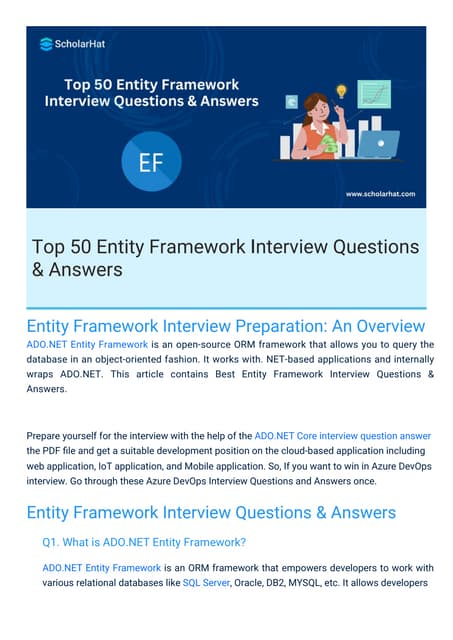



Entity Framework Interview Questions PDF By ScholarHatScholarhat
╠²
Entity Framework Interview Questions PDF By ScholarHatAI and Academic Writing, Short Term Course in Academic Writing and Publicatio...



AI and Academic Writing, Short Term Course in Academic Writing and Publicatio...Prof. (Dr.) Vinod Kumar Kanvaria
╠²
AI and Academic Writing, Short Term Course in Academic Writing and Publication, UGC-MMTTC, MANUU, 25/02/2025, Prof. (Dr.) Vinod Kumar Kanvaria, University of Delhi, vinodpr111@gmail.comFull-Stack .NET Developer Interview Questions PDF By ScholarHat



Full-Stack .NET Developer Interview Questions PDF By ScholarHatScholarhat
╠²
Full-Stack .NET Developer Interview Questions PDF By ScholarHatHannah Borhan and Pietro Gagliardi OECD present 'From classroom to community ...



Hannah Borhan and Pietro Gagliardi OECD present 'From classroom to community ...EduSkills OECD
╠²
Hannah Borhan, Research Assistant, OECD Education and Skills Directorate and Pietro Gagliardi, Policy Analyst, OECD Public Governance Directorate present at the OECD webinar 'From classroom to community engagement: Promoting active citizenship among young people" on 25 February 2025. You can find the recording of the webinar on the website https://oecdedutoday.com/webinars/
Interim Guidelines for PMES-DM-17-2025-PPT.pptx



Interim Guidelines for PMES-DM-17-2025-PPT.pptxsirjeromemanansala
╠²
This is the latest issuance on PMES as replacement of RPMS. Kindly message me to gain full access of the presentation. Year 10 The Senior Phase Session 3 Term 1.pptx



Year 10 The Senior Phase Session 3 Term 1.pptxmansk2
╠²
Year 10 The Senior Phase Session 3 Term 1.pptxASP.NET Web API Interview Questions By Scholarhat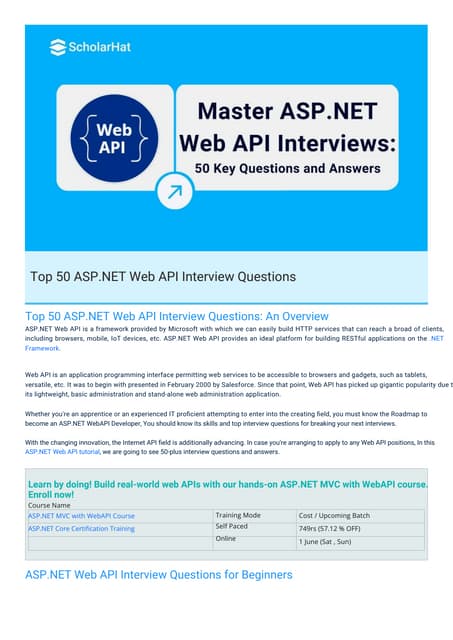



ASP.NET Web API Interview Questions By ScholarhatScholarhat
╠²
ASP.NET Web API Interview Questions By ScholarhatNUTRITIONAL ASSESSMENT AND EDUCATION - 5TH SEM.pdf



NUTRITIONAL ASSESSMENT AND EDUCATION - 5TH SEM.pdfDolisha Warbi
╠²
NUTRITIONAL ASSESSMENT AND EDUCATION, Introduction, definition, types - macronutrient and micronutrient, food pyramid, meal planning, nutritional assessment of individual, family and community by using appropriate method, nutrition education, nutritional rehabilitation, nutritional deficiency disorder, law/policies regarding nutrition in India, food hygiene, food fortification, food handling and storage, food preservation, food preparation, food purchase, food consumption, food borne diseases, food poisoningBß╗ś TEST KIß╗éM TRA GIß╗«A K├ī 2 - TIß║ŠNG ANH 10,11,12 - CHUß║©N FORM 2025 - GLOBAL SU...



Bß╗ś TEST KIß╗éM TRA GIß╗«A K├ī 2 - TIß║ŠNG ANH 10,11,12 - CHUß║©N FORM 2025 - GLOBAL SU...Nguyen Thanh Tu Collection
╠²
https://app.box.com/s/ij1ty3vm7el9i4qfrr41o756xycbahmgHelping Autistic Girls Shine Webinar ║▌║▌▀Żs



Helping Autistic Girls Shine Webinar ║▌║▌▀ŻsPooky Knightsmith
╠²
For more information about my speaking and training work, visit: https://www.pookyknightsmith.com/speaking/Inventory Reporting in Odoo 17 - Odoo 17 Inventory App



Inventory Reporting in Odoo 17 - Odoo 17 Inventory AppCeline George
╠²
This slide will helps us to efficiently create detailed reports of different records defined in its modules, both analytical and quantitative, with Odoo 17 ERP.How to create security group category in Odoo 17



How to create security group category in Odoo 17Celine George
╠²
This slide will represent the creation of security group category in odoo 17. Security groups are essential for managing user access and permissions across different modules. Creating a security group category helps to organize related user groups and streamline permission settings within a specific module or functionality.How to Configure Deliver Content by Email in Odoo 18 Sales



How to Configure Deliver Content by Email in Odoo 18 SalesCeline George
╠²
In this slide, weŌĆÖll discuss on how to configure proforma invoice in Odoo 18 Sales module. A proforma invoice is a preliminary invoice that serves as a commercial document issued by a seller to a buyer.AI and Academic Writing, Short Term Course in Academic Writing and Publicatio...



AI and Academic Writing, Short Term Course in Academic Writing and Publicatio...Prof. (Dr.) Vinod Kumar Kanvaria
╠²
Bß╗ś TEST KIß╗éM TRA GIß╗«A K├ī 2 - TIß║ŠNG ANH 10,11,12 - CHUß║©N FORM 2025 - GLOBAL SU...



Bß╗ś TEST KIß╗éM TRA GIß╗«A K├ī 2 - TIß║ŠNG ANH 10,11,12 - CHUß║©N FORM 2025 - GLOBAL SU...Nguyen Thanh Tu Collection
╠²
Ai soar
- 1. APPRECIATIVE INQUIRY X SOAR Randy T. Nobleza, Ph.D. School of Education April 18, 2017, EDM 202: social reasearh
- 2. AI x SOAR outline what is AI? AI five principles problem solving vs. AI cycle of four processes
- 3. Ap-preŌĆÖci-ate, v., 1. valuing; the act of recognizing the best in people or the world around us; affirming past and present strengths, successes, and potentials; to perceive those things that give life (health, vitality, excellence) to living systems 2. to increase in value, e.g. the economy has appreciated in value. Synonyms: VALUING, PRIZING, ESTEEMING, and HONORING. In-quireŌĆÖ (kwir), v., 1. the act of exploration and discovery. 2. To ask questions; to be open to seeing new potentials and possibilities. Synonyms: DISCOVERY, SEARCH, and SYSTEMATIC EXPLORATION, STUDY. WHAT IS APPRECIATIVE INQUIRY?
- 4. A POSITIVE REVOLUTION IN CHANGE: APPRECIATIVE INQUIRY BY DAVID L. COOPERRIDER AND DIANA WHITNEY Appreciative Inquiry is about the coevolutionary search for the best in people, their organizations, and the relevant world around them. In its broadest focus, it involves systematic discovery of what gives ŌĆ£lifeŌĆØ to a living system when it is most alive, most effective, and most constructively capable in economic, ecological, and human terms.
- 5. COOPERRIDER AND WHITNEY (2001) AI involves, in a central way, the art and practice of asking questions that strengthen a systemŌĆÖs capacity to apprehend, anticipate, and heighten positive potential. It centrally involves the mobilization of inquiry through the crafting of the ŌĆ£unconditional positive questionŌĆØ often involving hundreds or sometimes thousands of people. In AI the arduous task of intervention gives way to the speed of imagination and innovation; instead of negation, criticism, and spiraling diagnosis, there is discovery, dream, and design.
- 6. AI seeks, fundamentally, to build a constructive union between a whole people and the massive entirety of what people talk about as past and present capacities: achievements, assets, unexplored potentials, innovations, strengths, elevated thoughts, opportunities, benchmarks, high point moments, lived values, traditions, strategic competencies, stories, expressions of wisdom, insights into the deeper corporate spirit or soul-- and visions of valued and possible futures. - Cooperrider and Whitney
- 7. The constructionist principle The principle of simultaneity The poetic principle The anticipatory principle The positive principle The five principles of AI
- 9. problem solving vs. appreciative inquiry
- 11. Cycle of four process 1. DISCOVER: The identification of organizational processes that work well. 2. DREAM: The envisioning of processes that would work well in the future. 3. DESIGN: Planning and prioritizing processes that would work well. 4. DESTINY (or DEPLOY): The implementation (execution) of the proposed des








